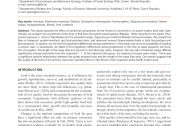Content
<
p>
This study explores the effect of nutritional composition on the fitness of consumers in a quadri-trophic food web. Specifically, we studied how enrichment of the food of fruit flies Drosophila melanogaster (Meigen, 1830) transfers to the spider Phylloneta impressa (L. Koch) (Theridiidae) and its parasitoid wasp, Zatypota percontatoria Mueller (Ichneumonidae). We reared fruit flies on balanced, protein-enriched, and lipid-enriched diets, and observed several fitness-related traits in both the predator and the parasitoid. In spiders, we did not find significant differences among treatments in their body size and the probability of building a cocoon web. In parasitoids, we failed to find significant differences among treatments in the time to wasp pupation, the duration of pupation, the length of the wasp tibia and pronotum, and the body mass. However, the sex ratio of hatched wasps differed significantly among treatments from the expected 1 : 1. In the balanced diet group, the majority of wasps were males. There was a significant positive relationship between the spider prosoma size and the length of the wasp fore wing. Our results suggest that the quality of the food of the primary consumer had little effect on the fitness of the organism at the fourth trophic level.<
/p>
p>
This study explores the effect of nutritional composition on the fitness of consumers in a quadri-trophic food web. Specifically, we studied how enrichment of the food of fruit flies Drosophila melanogaster (Meigen, 1830) transfers to the spider Phylloneta impressa (L. Koch) (Theridiidae) and its parasitoid wasp, Zatypota percontatoria Mueller (Ichneumonidae). We reared fruit flies on balanced, protein-enriched, and lipid-enriched diets, and observed several fitness-related traits in both the predator and the parasitoid. In spiders, we did not find significant differences among treatments in their body size and the probability of building a cocoon web. In parasitoids, we failed to find significant differences among treatments in the time to wasp pupation, the duration of pupation, the length of the wasp tibia and pronotum, and the body mass. However, the sex ratio of hatched wasps differed significantly among treatments from the expected 1 : 1. In the balanced diet group, the majority of wasps were males. There was a significant positive relationship between the spider prosoma size and the length of the wasp fore wing. Our results suggest that the quality of the food of the primary consumer had little effect on the fitness of the organism at the fourth trophic level.<
/p>



